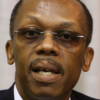Jean-Bertrand Aristide

Jean-Bertrand Aristide
Jean-Bertrand Aristideis a Haitian politician who became Haiti's first democratically elected president. A proponent of liberation theology, Aristide was appointed to a Roman Catholic parish in Port-au-Prince in 1982 after completing his studies to become a priest of the Salesian order. He became a focal point for the pro-democracy movement first under Jean-Claude "Baby Doc" Duvalier and then under the military transition regime which followed. He won the Haitian general election between 1990 and 1991, with 67% of the vote...
NationalityHaitian
ProfessionStatesman
Date of Birth15 July 1953
CountryHaiti
As far as we are concerned, we are ready to leave today, tomorrow, at any time, to join the people of Haiti, to share in their suffering, help rebuild the country, moving from misery to poverty with dignity.
We are all equal, rich and poor, and we need a society where the people enjoy their rights.
As we all know, many people remain buried under tons of rubble and debris, waiting to be rescued. When we think of their suffering, we feel deeply and profoundly that we should be there, in Haiti, with them, trying our best to prevent death.
When you care about human beings, you do your best to not repress and to not let people to repress and to not arm people to repress.
I know how the American people care for that democratic principle. They want to see their vote respected. As we in Haiti want to see the vote of the people respected.
Sometimes people who want to understand Haiti from a political perspective may be missing part of the picture. They also need to look at Haiti from a psychological perspective.
Far from home, I am living here, but always in deep communion with my people.
Blood has flowed in Hinche, ... It may be that the police cannot cope with this kind of attack.
None of these difficulties can be invoked by state agents to justify violations of human rights committed in total impunity.
I am ready to give my life if that is what it takes to defend my country,
Before the elections of the year 2000 which led me for the second time to the National Palace in Haiti, I had talked about peace, ... And throughout in the National Palace, throughout my tenure, I talked about peace. And today I continue to talk about peace.
If wars are expensive, peace can be even more expensive,
If we wish to maintain peace, then we cannot accept that impunity be provided to these international criminals and drug dealers.
Haitians don't like to say they are hungry because we are proud.